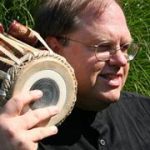

For the past 30 years, percussionist Scott Davidson has led world-music ensembles in Delaware, a decidedly non-commercial calling. He plays a mixture of music that is informed by different traditions of improvisation from jazz, classical Indian and Middle Eastern music.
Improvising while playing before a live audience requires intense focus, he says, and pushes him to be his best. “But when I’m playing, I don’t think about the audience too much because it’s too distracting,” Davidson says. “To play these compositions that we play, you have to concentrate and be in the moment with the music, or else you’re not really playing music.
“It’s sort of like the Buddhist mindfulness training, where you’re there, and if you do get distracted if you’re meditating or playing music, then you have to bring yourself back to where you are. Otherwise, you’re not really there playing. Especially if you improvise and you go places with the music that are unexpected. That’s the most important thing, to be able to listen to the other musicians, or else it’ll just end up being a mess.”
Davidson long ago sought the tutelage of Robert “Boysie” Lowery, whose legions of pupils included the heralded jazz trumpeter Clifford Brown. From 1976-78, Davidson studied classical Indian music in Ahmedabad, which is north of Mumbai and southeast of Karachi, Pakistan. Classical Indian music employs many devices, and Davidson’s fusion groups include these. They use scales from the Middle East, among other regions, and melodies from Indian compositions, though they don’t play classical Indian music.
“A lot of things that I play are hard to classify,” he says. “But a really good melody is a good melody no matter what country it comes from.”
Alongside his bandmates from his Scott Davidson Trio, Lloyd Shorter (oboe and English horn) and Roger Mgrdichian (oud), Davidson writes genre-defying music. And in September 2012, he and Shorter teamed with the Matthew Shipp Trio to put out the album “Dreamland,” which was fully improvised. Davidson, who calls the album “progressive jazz,” says the types of music he favors “will always be fringe music.”
“There’s a lot of music I think people would really like,” he says, “but they never hear it. It’s not on radio very much. When they do hear it, they like it.”
Some of the many percussion instruments Davidson plays are congas, djembe (West African) and dumbek (Middle Eastern). At 7 p.m. on Sunday, May 5, his trio will perform a concert at First Unitarian Church in Sharpley, North Wilmington. For one tune, he’ll play a Hang, which is based on steel-pan technology and looks like a flying saucer. The concert will feature a large component of improvisation, he says, with melodies from India, Mali, Turkey and throughout the Middle East.
Davidson also is writing a biography of Wilmington jazz legend Lem Winchester, a vibraphonist who was a friend and contemporary of Brown and studied with Lowery.
With the Division’s grant, Davidson has bought a portable recording device to aid in making demos and an effects device for certain electronic instruments to aid in looping. And after 35 years of craving a hammered dulcimer – its strings are stretched over a trapezoidal sounding board and are struck with small mallets – Davidson this year will purchase one for himself.
He plans to play it in a traditional Celtic context, but also non-traditionally, using looping and effects devices on the instrument.
Masters
Established
Emerging
Related Topics: arts fellowship, arts grants, dance, Delaware, delaware division of the arts, Department of State, Division of the Arts, emerging artist, fellowship, fiction, folk arts, literary arts, literature, media arts, music, performing arts, poetry, recipient, State of Delaware, visual arts